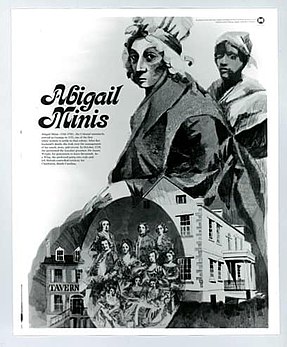Abigail Minis facts for kids
Abigail Minis (born August 11, 1701 – died October 11, 1794) was a very important businesswoman and landowner in Savannah, Georgia. She lived during the exciting time of the American Revolutionary War. Abigail and her husband, Abraham Minis, moved to the new colony of Savannah in 1733 from Europe. Even though they weren't sure if they would be allowed in, General James Oglethorpe, who started the colony, welcomed them and gave them land.
Abigail helped the American rebel soldiers during the war by giving them money and a place to stay. Because of her help, she is remembered as a hero of the Revolution.
Her family has continued to live in Savannah for many generations.
Contents
Life and Work
Early Life and Family
Abigail Minis was born on August 11, 1701. She came from a Jewish family in Germany.
Before moving to America, she married Abraham Minis. They had two daughters, Leah (born 1726) and Esther (born 1731). In 1733, the family sailed to colonial America on a ship called the William and Sarah.
Their third child, Philip, was born in Savannah in 1734. He was the first white male child born in the new Georgia colony. Abigail and Abraham had six more children after Philip.
Settling in Georgia
The Minis family arrived in Savannah on July 11, 1733. This was shortly after General James Oglethorpe founded the colony. Oglethorpe gave land to the Minis family. Abraham's name is on one of the first land deeds in the colony from December 1733.
By 1736, Abraham Minis became a merchant shipper. This means he bought and sold goods using ships. He was one of the first people in Georgia to start a business. He worked with a local man in a business called Minis & Salomons. Some historians believe they were the very first merchants in Georgia.
Many colonists left Georgia around 1740 because they disagreed with the rules of the colony's founders. However, the Minis family chose to stay.
Abigail as a Businesswoman
Abraham Minis died on January 13, 1757. Abigail was left to raise their eight children on her own. She took over the family businesses and started new ones.
During the American Revolutionary War, Abigail was a strong supporter of the American rebels. She supplied the rebel troops with food and other important items during the siege of Savannah.
Abigail owned a large plantation and had property in four different counties in Georgia.
When the British took over Savannah in December 1778, Abigail was accused of supporting the rebellion. But the British Royal Governor, James Wright, allowed her to leave safely for Charleston, South Carolina. He also let her keep her property.
Before she left, Abigail showed her courage. She brought food to her friend Mordecai Sheftall in prison. He was a fellow American patriot captured by the British.
Later Years
Abigail returned to Savannah in 1783 after the war ended. She reopened a tavern that she had started twenty years earlier. She ran the tavern with her five unmarried daughters.
Her tavern became a popular place for important people. Members of the Georgia assembly, judges, and wealthy merchants all visited. The tavern stayed open until 1779. Even in her 80s, Abigail was still buying land in Georgia and South Carolina.
It is not known for sure if Abigail met George Washington when he visited Savannah in 1791. She was 91 years old at the time. However, her daughter, Leah, did have a meeting with the president.
Death
Abigail Minis died on October 11, 1794, in Savannah. She was 93 years old. She had lived 37 years longer than her husband.
Abigail is buried in the Mordecai Sheftall Cemetery. This is a Jewish cemetery in Savannah. Her husband is buried in a different cemetery in the city.
Descendants
Abigail Minis's family continued to be important in Savannah. Her great-grandson, also named Abraham, built many properties in Savannah in the 1800s. He was a very respected merchant and citizen.
Later members of the Minis family helped start important groups in Savannah. These included the Congregation Mickve Israel, the Hibernian Society, and the Oglethorpe Club.
In 2015, Florence Minis Slatinsky, a descendant, was interviewed by Georgia Public Broadcasting.
 | James B. Knighten |
 | Azellia White |
 | Willa Brown |


